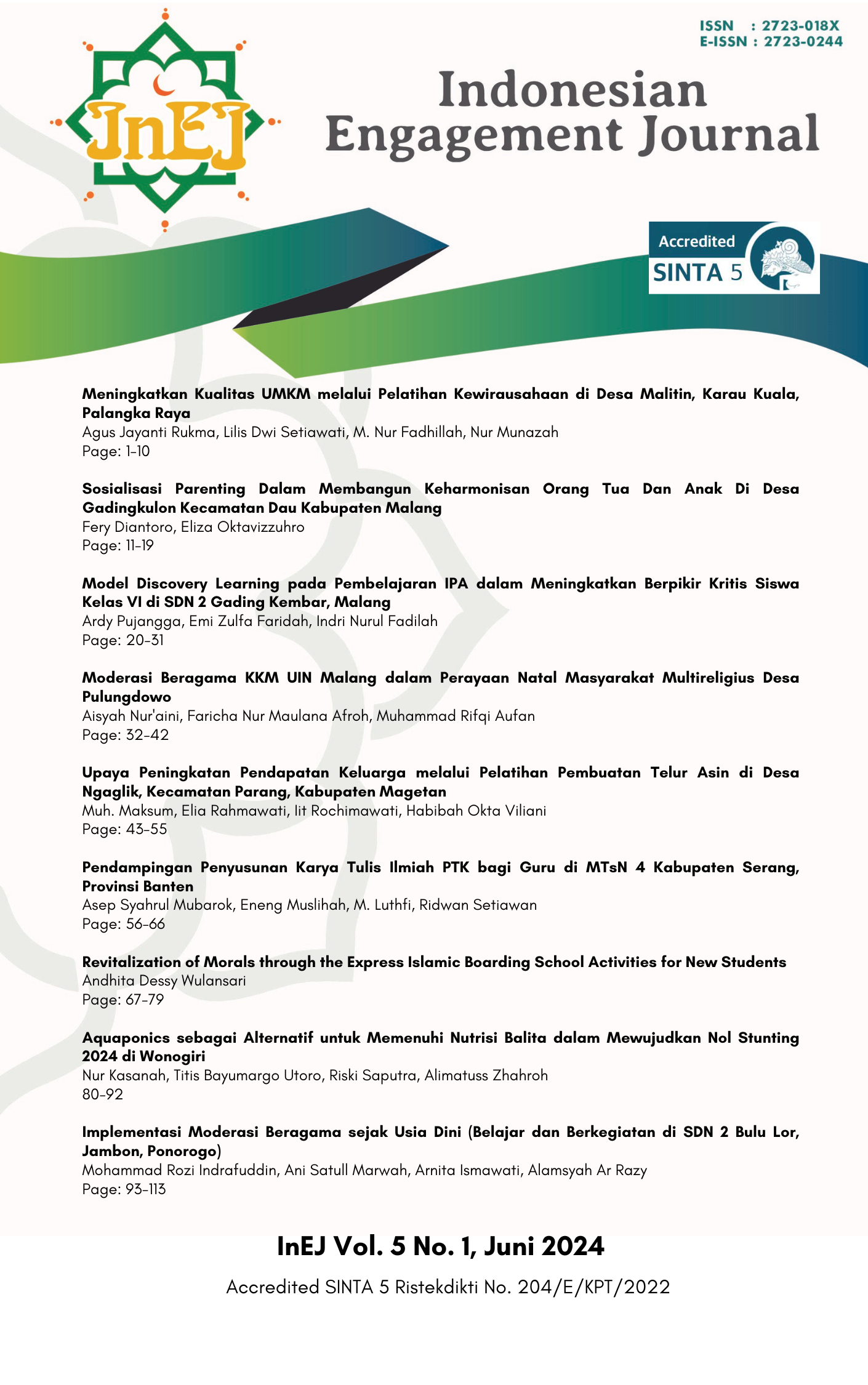PELATIHAN DAN PENDAMPINGAN SANTRIPRENEUR DALAM PEMBUATAN HANTARAN DI PONDOK PESANTREN PUTRI AL-AMIN HUDATUL MUNA, KABUPATEN PONOROGO, TAHUN 2022
DOI:
https://doi.org/10.21154/inej.v5i1.5585Abstract
Pengabdian ini bertujuan untuk mengukur tingkat pengetahuan santri terkait konsep santripreneur dan kewirausahaan, serta memahami proses pelatihan dan pendampingan dalam pembuatan hantaran pernikahan di Pondok Pesantren Putri Al-Amin Hudatul Muna, Kabupaten Ponorogo. Metode pemberdayaan yang digunakan adalah Asset Based Community Development (ABCD), yang berfokus pada pengembangan potensi komunitas. Hasil pengabdian menunjukkan peningkatan signifikan pada pemahaman santri mengenai santripreneur dan kewirausahaan, mencapai 83% setelah pelatihan dan pendampingan. Seluruh peserta juga berhasil membuat dan mempersiapkan pernak-pernik hantaran secara mandiri. Pengabdian ini tidak hanya meningkatkan keterampilan teknis, tetapi juga membangun kepercayaan diri santri dalam bidang kewirausahaan. Seluruh peserta menyatakan kepuasan terhadap program yang dilaksanakan.
Kata Kunci: Santripreneur, Kewirausahaan, Hantaran, Pelatihan, ABCD
References
Karnadi. “Pendampingan Terhadap Ibu-ibu dan Remaja Puteri pada Pelatihan Pembuatan Hantaran Pengantin di PKBM 01 Kemayoran Jakarta Pusat.” SARWAHITA : Jurnal Pengabdian Kepada Masyarakat Vol 11, no. 1 (2014): 48”“52. https://doi.org/10.21009/sarwahita.111.09.
Kementrian Perindustrian Republik Indonesia. “Santripreneur Wujudkan Ekonomi Berbasis Syariah,” 2017.
Mahardika Arya. “Apa itu Santripreneur? : Apa Saja Peluang Besarnya.” Biuus Indonesia, 2019. https://biuus.com/apa-itu-santripreneur-apa-saja- peluang-besarnya/.
Mahmud, Mahmud, Mila Sartika, dan Hendri Hermawan Adinugraha. “Pendampingan Peningkatan Santripreneur Pada Siswa-Siswi Pondok Pesantren Uswatun Hasanah Sebagai Bekal Menjadi Wirausaha.” ABDIMASKU : JURNAL PENGABDIAN MASYARAKAT 3, no. 1 (11
Februari 2020): 65”“70. https://doi.org/10.33633/ja.v3i1.74.
Makmun, H. A. Rodli. “Pembentukan Karakter Berbasis Pendidikan Pesantren: Studi di Pondok Pesantren Tradisional dan Modern di Kabupaten Ponorogo.” Cendekia: Jurnal Kependidikan dan Kemasyarakatan 12, no. 2 (25 Januari 2016): 211”“38.
https://doi.org/10.21154/cendekia.v12i2.226.
Peraturan Pemerintah. “Tentang: Kerangka Kualifikasi Nasional Indonesia, Nomor 8,” 2014.
Saifudin, Ahmad. “Pendidikan Kewirausahaan Dalam Prespektif Idealisme Santripreneur.” Intizam, Jurnal Manajemen Pendidikan Islam 3, no. 1 (10 Oktober 2019): 55”“65.
Santripreneur.co.id. “Santripreneur Indonesia Gelar Santripreneur Camp Untuk Santri Dan Pelajar Di Salatiga ”“ Santripreneur.” Diakses 29 September 2022. https://santripreneur.co.id/santripreneur-indonesia- gelar-santripreneur-camp-untuk-santri-dan-pelajar-di-salatiga/.
Suciati, Herlina. “Penerapan Metode Mind Mapping Guna Menunjang Pemahaman Santri Dalam Memahami Kitab Nurul Yaqin di Pondok Pesantren Putri Al-Amin Hudatul Muna.” Artikel Pengabdian Masyarakat. Ponorogo, 2021.
Tim LPPM. Panduan KPM ABCD IAIN Ponorogo. Ponorogo: Lembaga Penelitian dan Pengabdian Kepada Masyarakat, 2019.
Tolib, Abdul. “Pendidikan Di Pondok Pesantren Modern.” Risâlah, Jurnal Pendidikan Dan Studi Islam 2, no. 1 (2015): 60”“66. https://doi.org/10.31943/jurnal_risalah.v2i1.12.
U Sihombing. Pendidikan Luar Sekolah (manajemen strategi). Jakarta: PD Mahkota, 2020.
Downloads
Published
Issue
Section
License
Please find the rights and licenses in InEJ. By submitting the article/manuscript of the article, the author(s) agree with this policy. No specific document sign-off is required.1. License
The non-commercial use of the article will be governed by the Creative Commons Attribution license as currently displayed on Creative Commons Attribution-NonCommercial-ShareAlike 4.0 International License.
2. Author(s)' Warranties
The author warrants that the article is original, written by stated author(s), has not been published before, contains no unlawful statements, does not infringe the rights of others, is subject to copyright that is vested exclusively in the author and free of any third party rights, and that any necessary written permissions to quote from other sources have been obtained by the author(s).
3. User/Public Rights
The spirit of InEJ is to disseminate articles published are as free as possible. Under the Creative Commons license, InEJ permits users to copy, distribute, display, and perform the work for non-commercial purposes only. Users will also need to attribute authors and InEJ on distributing works in the journal and other media of publications. Unless otherwise stated, the authors are public entities as soon as their articles got published.
4. Rights of Authors
Authors retain all their rights to the published works, such as (but not limited to) the following rights;
Copyright and other proprietary rights relating to the article, such as patent rights,
The right to use the substance of the article in own future works, including lectures and books,
The right to reproduce the article for own purposes,
The right to self-archive the article,
The right to enter into separate, additional contractual arrangements for the non-exclusive distribution of the article's published version (e.g., post it to an institutional repository or publish it in a book), with an acknowledgment of its initial publication in this journal (InEJ: Indonesian Engagement Journal).
5. Co-Authorship
If the article was jointly prepared by more than one author, any authors submitting the manuscript warrants that he/she has been authorized by all co-authors to be agreed on this copyright and license notice (agreement) on their behalf, and agrees to inform his/her co-authors of the terms of this policy. InEJ will not be held liable for anything that may arise due to the author(s) internal dispute. InEJ will only communicate with the corresponding author.
6. Royalties
Being an open accessed journal and disseminating articles for free under the Creative Commons license term mentioned, author(s) aware that InEJ entitles the author(s) to no royalties or other fees.
7. Miscellaneous
InEJ will publish the article (or have it published) in the journal if the article’s editorial process is successfully completed. The editors of Journal may modify the article to a style of punctuation, spelling, capitalization, referencing and usage that deems appropriate. The author acknowledges that the article may be published so that it will be publicly accessible and such access will be free of charge for the readers as mentioned in point 3.




